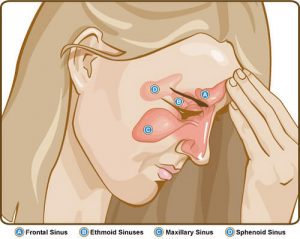 Sinusitis is a type of sinus infection which is characterized by the inflammation of tissues lining the Paranasal sinuses. Normal sinuses are a vital part of the respiratory system. It warms and moistens the inhaled air before entering the lungs. In normal cases, sinuses are cavities in the facial area which are filled with air. However, when suffering sinusitis, the cavities are filled with mucous which becomes a fertile breeding place for germs.
Sinusitis is a type of sinus infection which is characterized by the inflammation of tissues lining the Paranasal sinuses. Normal sinuses are a vital part of the respiratory system. It warms and moistens the inhaled air before entering the lungs. In normal cases, sinuses are cavities in the facial area which are filled with air. However, when suffering sinusitis, the cavities are filled with mucous which becomes a fertile breeding place for germs.
Types of Sinusitis
Acute sinusitis — This is generally the most common form of sinusitis. It often lasts not more than 4 weeks and generally goes away without severe medication. People suffering from acute sinusitis generally experience facial pain for the first 10 to 14 days after the onset of the infection.
Chronic sinusitis – People suffering from chronic sinusitis attacks generally experience sinus infections lasting more than 4 weeks. People suffering from chronic sinusitis must seek medical advice from a physician to diagnose the cause of the problem. There are cases where chronic sinus infections are caused not only by bacteria, but by polyp growth inside the sinuses.
Recurrent sinusitis — This type of sinusitis occurs several times a year and often at short intervals. Sufferers are advised to seek medical advice and improve the environment in which they live. There are cases where surgical procedures are done to remove the inflamed sinus tissues and extract the congested mucous fluids to alleviate the patient’s condition.
What Causes a Sinusitis Infection?
The main causes of sinusitis are bacterial infection and the growth of nasal polyps. The presence of both causes the tissues in the sinuses to swell up and mucous to fill up the cavities. Allergies are also another factor for frequent bouts of sinusitis; however most individuals regularly experience a serious sinus infection once every year.
How to Cure a Sinus Infection?
Addressing potential triggers or contributing factors is a key first step in the management of sinusitis. To reduce congestion due to sinusitis, your doctor may prescribe nasal sprays (some may contain steroid sprays), nose drops, or oral decongestant medicine.
If you suffer from severe chronic sinusitis, oral steroids might be prescribed to reduce inflammation — usually only when other medications have not worked. Antibiotics will be prescribed for any bacterial infection found in the sinuses (though antibiotics are not effective against a viral infection). An antihistamine may be recommended for the treatment of allergies. Antifungal medicine may be prescribed for a fungal sinus infection. Immunoglobulin (antibodies) may be given if you have certain immune deficiencies.
Importance of Conventional Medical Advice in Sinusitis Treatment
Though there are home remedies that may offer relief, it is important to seek a consultation with a physician. There are cases where people suffering from sinusitis are suddenly diagnosed with other more serious problems. A consultation with our experienced nasal and sinus specialist in Houston, Dr. C. T. Nguyen, will help you to understand more about your sinusitis condition and the available treatments.
